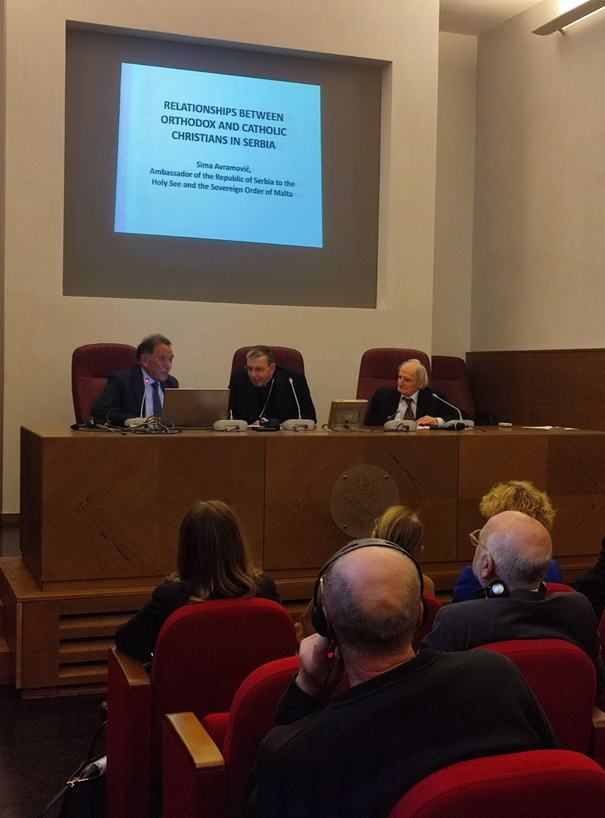Ambassador of the Republic of Serbia to the Holy See Sima Avramović took part in the Conference on inter-Christian relationships organized by the International Association Carità politica approved by the Holly See. After a short introduction by its founder Prof. Alfredo Luciani, the keynote speaker was H.E. Cardinal Kurt Koch, President of the Dicastery for Promoting Christian Unity.
As an invited speaker Amb. Avramović was firstly speaking about the early historical roots of relationships between Orthodox and Catholic at Balkans and their blending. He particularly pointed to connections of the first Serbian Nemanjić dynasty with the Catholics, such as coronation of king Stephan the First-Crowned by the papal legate in 1217, as well as mix marriages and family ties between the first Serbian kings and European Catholic princesses (Ana Dandola, Helen of Anjoy/ Angevin). He also noted that the first Serbian legal code – Nomocanon of St. Sava of 1219 was a kind of compilation of Roman-Byzantine civil and Church law with some elements of the Slav customary law.
Amb. Avramović pointed that geographically, historically, politically, in terms of religion and culture, Serbia was and still is at the cross-road between West and East. During the XIV and XV century it became a “buffer zone” between the Ottoman Empire and Europe, having been at the first defence line of Christianity. After rebellions against Ottoman rule in 1804 and 1815 and creation of the modern Serbia, the first Constitution of 1835 provided for religious freedom to all confessions. The Concordat between Kingdom of Serbia and Vatican was concluded already in 1914 but diplomatic relations between newly formed Kingdom of Serbs, Croats and Slovenians and the Holy See were established in 1920 due to WWI. During the XX century relationships between the two states had been passing through different obstacles and problems, while in the XXI century they have been gradually improving.
He also referred to closeness of mutual relationships between Orthodox and Catholic Christians in the Republic of Serbia due to their centuries-long common life, history, tolerance, mixed marriages and developed dialogue. A significant burden in those relations are tragic sufferings of hundreds thousands of Serbs, Jews and Roms during the WW II particularly in the concentration and extermination camp of Jasenovac operated by the pro-Nazi regime of Ustashe in Croatia. Amb. Avramović pointed to important role of actual Serbian Patriarch Porfirije in fostering the process of reconciliation. He added that the Law on Religion in Serbia of 2006 provides for seven “traditional religions”, including the Roman-Catholic Church, enjoying equal rights and status as Serbian Orthodox Church. Common devotion to ecumenical dialog is obvious as well as its dynamic, fostering prospective of future relationships between Orthodox and Catholic Christians in Serbia. Republic of Serbia and its Embassy to the Holy See is devoted in facilitating inter-religious dialogue and cooperation between the Serbian Orthodox and Roman Catholic churches.
